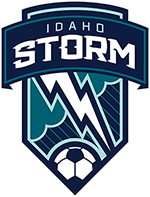Idaho Storm Soccer Club believes that many concerns and/or complaints (grievances) received by a youth soccer organization can be adequately addressed internally by the parties involved, by the coaches themselves, or with input from the club’s Director of Coaching. The soccer club expects direct communication among coaches, players and parents. Players are instructed to address their concerns directly with their coach, while parents do so with each other and their coaches. However, in the rare event that grievances are not satisfactorily resolved, there is a specific process that needs to be followed. The following policy explains this process.
A. Definition: A grievance is a complaint of a general nature, which may be based upon a specific rule violation, or upon a specific administrative decision (or lack of decision).
B. Informal Procedure: Parents may approach coaches to voice complaints or displeasure with coaching actions and/or decisions, however, a period of 24 hours should pass after the game or practice in question. The parent should arrange a meeting to speak directly with the team’s coach. This should be done when the coach is not coaching and when there are no other players or parents present. If the grievance is not resolved by the individuals on a one-to-one basis, then a formal procedure begins.
C. Formal Procedure: When grievances do occur and need a formal resolution, the following course of action will be taken by the person or persons bringing it forward:
-
- Step 1. If a parent-parent issue is unresolvable, the grievance will then be brought to the attention of the team coach(s) for further review and resolution. If coaches are unable to find a satisfactory settlement to the conflict, then it will be brought to the Board of Directors (in writing) through the Director of Coaching for evaluation. Director of Coaching shall acknowledge receipt of written grievance to the person(s) making the grievance.
-
- Step 2. Grievances that have been made through the Director of Coaching and are not satisfactorily resolved by all parties will then be addressed by the whole board, reviewed and a timeline for resolution established. If the Board of Directors takes on a grievance that has been passed on by the Director of Coaching, contact with the person(s) making the grievance will be conducted as expeditiously as possible to achieve the best resolution available.
- If the grievance does not have a basis in an existing rule, the grievance essentially presents a perceived problem which may require the adoption of new rules and/or club policies. If a grievance takes place as part of a tournament, league, or other competition that is sponsored and operated under the direction of other clubs or the Idaho Premier League (IPL), the event director of a specific competition does not have authority to modify rules in response to a grievance. An event director who receives a grievance shall forward the complaint to the appropriate club for review.
D. Hearing by Board of Directors: The Board of Directors of the club is ultimately responsible for making the final decision on a grievance. Confidentiality must be maintained by all board members throughout the entire grievance process. The Board shall determine the procedures necessary for dealing with any specific grievance. Some of the options a Board may choose to use in handling a grievance once it has been passed on by the Director of Coaching to the full board include:
-
- The Board may create a subcommittee to hear and decide the grievance. Any subcommittee shall, however, have no fewer than three members.
- The Board may hear the grievance at any Board meeting. Quorum requirements for Board action as specified in the club bylaws will apply to making any decision on the grievance.
- The Board may conduct an open hearing and invite testimony from additional parties.
- The Board may conduct a closed hearing and reach a decision based on the documents submitted with the grievance.
- The Board may appoint one or more persons to investigate the grievance and submit a report to the Board, then decide the grievance based upon the report.
- The Board may adopt any other procedure that it believes will assist it in making an informed decision on the grievance.
E. Time of Decision: Unless the Board specifically extends the time to decide a grievance, a final decision on the grievance shall be made within 30 days after initial receipt of the complaint.
F. Notification of Decision: The Board shall provide written notification to the party submitting the grievance of its final decision.
G. No Appeal: The decision of the Board is final on any grievance. No appeal is available from the decision of the Board.
H. Grievance/Complaint: Format and Contents of written grievance: If an attempt to resolve the conflict with a parent or coach was made and no satisfactory resolution was achieved; the next step is to bring it to the Director of Coaching, using the following procedures.
- The initial grievance/complaint must be documented in writing and will contain, at a minimum, the following:
-
- The name of the person or organization against whom the grievance is submitted.
- The name of the person submitting the grievance.
- The nature and specifics of the grievance with sufficient detail, in order that the opposing party will be able to appropriately respond to the allegations.
- The steps that have been taken so far in addressing the grievance.
- A listing of the rules or procedures that have been violated.
- Appropriate documentation supporting the allegations. Details may include items such as dates and times, name of team, coaches, players, referees and other staff.
- A statement outlining the desired result.
- A Referee Game Report may be accepted as a document of support in an official allegation of misconduct, regardless of the format in which it has been filed.
